ZIMBABWE'S SILENT MINORITY
(published in Swara and the Mail and Guardian, 2001)
Click to download in pdf format"What is man without beasts? If all the beasts are gone, man would die from a great loneliness of spirit. For whatever happens to the beasts, soon happens to man. All things are connected."
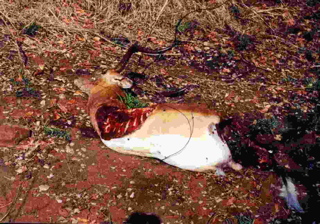
In the past year Zimbabwe has been a country shrouded in tragedy and rarely out of the news. Through President Robert Mugabe's government, the struggles of the landless and the landed have culminated in senseless injustice, debilitating petrol queues, power cuts, diminishing medical supplies, increasing unemployment, torture, intimidation and murder. None of this will be news to anyone, but there is a voiceless minority in Zimbabwe whose plight, as a result of this political upheaval, goes largely unreported.
In the past 6 weeks one farm alone has seen the violent death of 1500 Kudu, 3 Cheetah, 4 rhino and several elephant caught in poachers' snares, or shot by automatic weapons. Poaching in Zimbabwe has hit critical proportions since the takeover of ranches, farms and conservancies by the so-called 'war veterans' (many are youngsters of no more than 19!). The Department of Wildlife and private conservators are trying desperately to control the situation and protect the animals that remain, but with limited resources, so much confusion and insecurity on the land, and faced with such a powerful adversary, their efforts are largely in vain.
One of the hardest hit areas is the Save Valley Conservancy. At 340,000 hectares it is one of Africa's largest conservancies. Save Valley supports over 600 elephant, one of the country's largest wild dog populations, and has experienced an unprecedented growth rate of about 10% per annum of the Black Rhino - making it the most successful rhino breeding programme in Africa. There are now 200
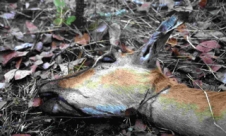
Black Rhinos in these Lowveld conservancies and 50 White. Private farms and conservancies protect 70% of the national total of Rhinos. On neighbouring Chiredzi Conservancy, 50 Wild Dogs, one of the continent's most endangered species, make up the third largest population of the species in Africa. These animals are now desperately threatened. Over the past months, both Conservancy areas have become home to thousands of squatters, much of the land being on the list for 'compulsory acquisition' by the government for resettlement. Encouraged by Mugabe's rhetoric, lawlessness and destruction have accompanied the illegal land seizures. Poaching and snaring have decimated the area (it is thought that the Save Conservancy may have lost over 3,000 animals so far) and in Chiredzi 40% of the area has been destroyed by burning.
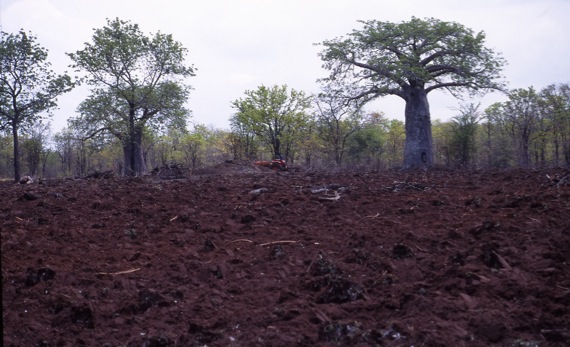
The worst thing is the deforestation. Mopane forests, which take years and years to regenerate, are being hammered really hard by the slash and burn agriculture. Big chunks of forest are being cut down and burnt, opening up the bush, and exposing vast tracts of soil to erosion. A whole ecosystem is being destroyed.' - Rob Style, Manager, Chiredzi Conservancy.
It is ironic that these battles are being fought on land that the Government once deemed unsuitable for dry-land resettlement schemes. It gave its full support and blessing to projects such as that instigated by the WWF to reverse the fortunes of the endangered Rhino. The government even put a special protection order on the Rhino (all Rhino are officially the property of the government), and now that same government is effectively endorsing their capture and the destruction of their habitat.
The Department of National Parks are fully cooperative in the attempts to prevent snaring in Save and protect the lives of snared Rhinos. But their hands are tied as political will does not appear to support them. With so many dedicated members of the Parks who have seen their colleagues lose their lives in defence of the rhino, it must be a matter of extreme sadness and frustration to see these same rhino carelessly butchered in the name of politics.
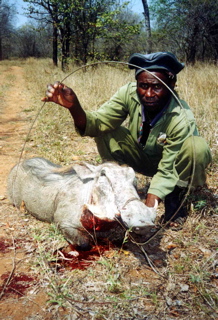
The conservancy owners have been meeting with the representatives for the 'war veterans' and the Provincial Governor, in charge of all land policies in the district, to try and find an amicable solution to this devastating situation. But the word is that the government does not want these islands of white-owned lands to exist at all - be it for the sake of the animals, or not. In such cases the squatters have carte blanche to do as they please. Ranch scouts have been disarmed, intimidated, and sometimes severely assaulted as they have attempted to perform their duties. On one of these ranches, the Chairman of the War Veterans for the area informed the ranch that if anyone from the farm management (notably game scouts and anti-poaching units) were seen on the land, they would be arrested by the war veterans for trespassing on their territory! Properties have been burnt out, trees cut down and in addition to hundreds, if not thousands, of antelope species being snared, endangered and protected animals have also suffered. There are several cases of Rhino snaring, Leopard and Cheetah deaths, Wild Dogs (one had to be put down after a snare perforated its abdominal cavity), and recently a young Elephant calf was snared and killed, its meat removed by poachers. The modus operandi of the poachers is to set a minefield of cable snares (made from the fences that surround the perimeter of the conservancies) which act by slowly strangling their victims to death. The poachers then send children in to collect the meat as they are too young to be arrested or convicted.
For 11 years the Painted Hunting Dog Research Project of Zimbabwe has carried out an intensive battle to protect the endangered Wild Dog species. Since the project started the population has doubled from 350 to 700 - the only country in Africa where this has occurred. The project has also been decimated by indiscriminate snaring. One of Greg Rasmussen's study packs consisted of 3 adults and 10 pups. All 3 adults were snared resulting in the death of the Alpha male, and the crippling of the yearling male. The female was saved as the radio collar around her neck miraculously protected her from the wire. With only one adult dog active, it is likely all the pups will die.
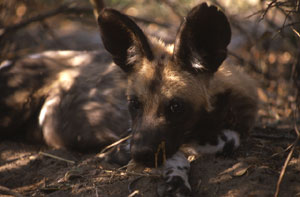
Other packs have been similarly affected. A white hunting entrepreneur has also taken advantage of the situation and ordered the killing of another alpha male as the pack 'threatened his trophy antelope'! Several other members of the pack were also killed, and once again, without their leader, the remaining youngsters in the group will almost certainly die. Rasmussen, who also heads an anti-poaching unit, is determined to wage war against the effects of Mugabe's latest land policies. At present he is helping to keep the threatened pups alive, and in the next month hopes to locate a healthy Wild dog pack which might adopt the pups.
'Endangered, and struggling to survive across Africa, yet picking up nicely in Zimbabwe, this was the last thing we, the dogs, or anybody else needed… To add to the dogs, recently I have had to deal with snared bush buck, lions, zebra, elephant… It has been a nightmare.' - Greg Rasmussen.
When the game guards do catch poachers, the enforcement of penalties has been negligible. It would appear that the police are no longer able to uphold the law and one Senior Commissioner has confessed to having their 'hands tied' due to 'orders from above'. Earlier this year, Roger Whittal, owner of a section of land in the Save conservancy, came home one afternoon to find one of his Safari Camps overrun by illegal settlers. In the process of skinning an impala, the group consisted of several well known poachers who had been previously apprehended. On reporting the incident to the Police they eventually arrived at the farm accompanied by a man believed to be one of the district leaders of the war veterans. The police informed Mr.Whittal that there was nothing they could do, that it was not his camp any more but 'theirs' (indicating the invaders). Since then there has been widespread poaching on the conservancy including an elephant whose tusks had been removed. Sections of the conservancy have been made a 'no go' area for the game scouts who have suffered abductions and beatings. One received serious panga wounds across his back from a war vet calling himself 'Killer'. Despite Killer's crimes, he will be one of the offenders who will have benefited from Mugabe's recent amnesty for all 'politically motivated' violence.
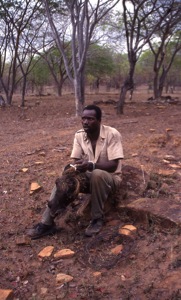
Recently the National Parks Anti-Poaching Unit went on to Whittal's land in Save and managed to catch a number of poachers. Unfortunately one of the youngsters caught was prone to asthma and had an attack from which he died. Despite the post-mortem confirming that the youth died from natural causes, the CID arrested two of Whittal's game scouts (the National Parks guards were untouched) and allegedly beat them up resulting in their statements being changed, accepting responsibility for the death. These cases are not isolated incidents. There are similar horrifying stories throughout the Conservancies.
'The crazy thing is that these squatters don't even want the land - the leadership have told me that it's too dry and too rough. Yet Agritex are in there now, pegging out 32 hectare blocks of land which people won't be able to do anything with - they'll die if they have to try and live off it!' - Roger Whittal, Save Conservancy.
What is more, it has become apparent that most of the squatters that are on Whittal's land are not suffering from genuine land-hunger.
No one is landless here. They either have plots on communal land, or their own farms - a large proportion have sugar farms - which they go back to frequently. It's all just a matter of harassment - it's a political game.' - Roger Whittal.
Above the police are the provincial governors whose orders come directly from Mugabe. Governor Hungwe is currently the self-professed 'supreme power' in the Masvingo District where the worst atrocities have occurred (Save Valley Conservancy comes under his jurisdiction). To him, all the above evidence is no more than a white conspiracy to discredit the government: 'Poaching is being done by the workers of the conservancies - they want to tarnish the name of Zimbabwe and the President. The police have told me they have arrested so many people - all workers from the conservancies.' Hungwe has visited one of the ranches complaining of poaching and says the owners were unable to show him any evidence. They told him he'd arrived '6 months too late'. Hungwe continues '… he (the rancher) was lying… he was organising his workers to poach, take pictures of dead animals with snares on their necks in order to show the outside world that there was a state of lawlessness in Zimbabwe'.
The removal of the perimeter fencing by the poachers allows wildlife to disperse from conservancies and already 4 elephants have been shot in Save's adjacent community land. Without fences there is also a risk of disease. Foot-and-mouth carried by Buffalo and other wild ungulates could be allowed to spread to domestic livestock that are normally separated from wildlife by substantial veterinary control fences. Their destruction has major economic implications, and European Union officials are already considering a suspension of Zimbabwean beef exports to Europe.
The WWF in Zimbabwe are doing their utmost to try and open dialogue between the conservancies, NGOs and the government in the hope that a solution can be found which would involve rational land use policies, serving both the community and the protection of wildlife. So far, the government has been unwilling to cooperate. The conservancies and Game Parks are seen as 'colonial impositions' and there seems to be an irrational obsession with deposing all white land-owners - whether it makes environmental and economic sense, or not.
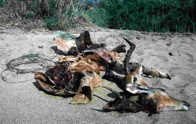
In their desperation, farmers with game are now darting their animals and relocating them to 'safe havens' (other farms which are not on 'the list' for acquisition, or to land outside the country). In the next month a rescue operation is planned for hundreds of Nyala recently translocated from South Africa. If the Nyala are to survive in Zimbabwe they must be relocated again, and a massive operation is underway to move them to land leased by the Tikki Hywood Trust (itself threatened by takeover). The Trust, which specialises in breeding smaller mammals on the endangered list (such as Aardwolf, Pangolin and the Black-footed cat), has also had enormous success increasing the numbers of Zimbabwe's most endangered mammal, Lichtenstein's Hartebeest, from 46 to over 200 in five years. Whilst the Trust has every hope that an application to be delisted will be successful, at present they (and the animals they protect) also stand to lose from the resettlement programme. Lisa Hywood Barnard, the Trust's owner, feels the crisis to the country's animal population more than anyone - 'Breeding endangered animals makes you aware of how sensitive the ecosystem is, and in Zimbabwe today these animals don't stand a chance. Even if we manage to breed species successfully, there is nowhere we can release them - apart from our own farm which is also under threat.'
On this battlefield we must also be mindful that it's not only the animals that are suffering. Large numbers of people, once gainfully employed in the safari industry (Zimbabwe's primary earner of precious foreign exchange), have now lost their jobs due to the dramatic decline in tourism. In many of the conservation areas, community outreach programmes, designed to ensure local populations benefit from tourism in the area, have also collapsed.
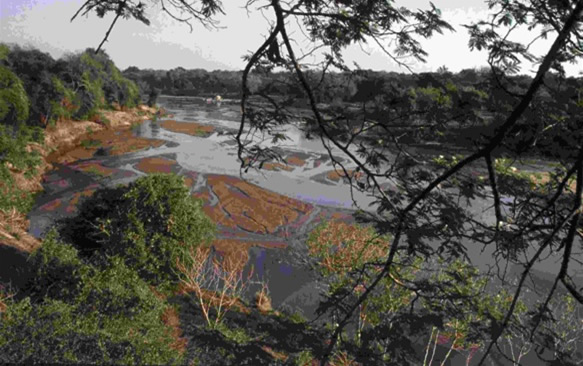
'We desperately need to get our country back on track. This year's safari industry just got by, but the eco-tourism, and tourism as a whole, took a huge knock. The damage has already been done to the industry, any more exposure of the wildlife to slaughter may be the final nail in the coffin'. - Mike Clark, Regional Chairman for the CFU, Masvingo.
In what has become a conservation war, it is significant that none of those doing battle on the frontline - the individual conservationists, farmers, Commercial Farmers Union, or the Department of Wildlife, have given up hope. Amongst the death, maiming and tragedy, they continue to fight against all odds to try and find solutions to the current situation, and preserve what they can of their country's natural heritage.
If this widespread devastation is not halted, the long-term implications are enormous. Not only will the environment suffer, but tourism, a life source for so many, may no longer be an option in the country's recovery. The more vulnerable species will become extinct, habitats will be destroyed, and conservancies will be forced to close. Already the country is on its knees - just how much more can it take?
Zimbabwe, take heed - "For whatever happens to the beasts, soon happens to man…."
Jenny Sharman, October 22nd 2000.
